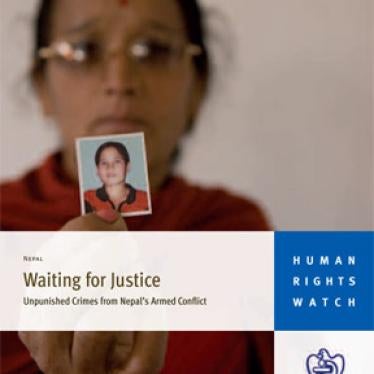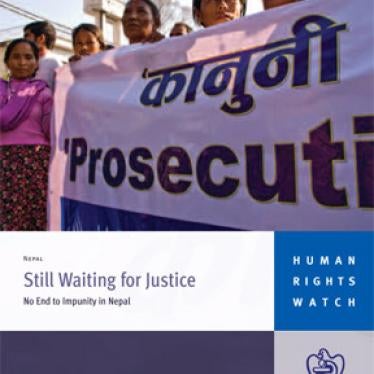(Kathmandu) - Nepal's government has failed to act on thousands of extrajudicial killings, torture, and enforced disappearances during the decade-long armed conflict with Maoists that ended in 2006, Human Rights Watch and Advocacy Forum said in a joint report released today. This lack of accountability is contributing to a breakdown of law and order in many parts of the country, Human Rights Watch and Advocacy Forum said.
The 41-page report, "Indifference to Duty: Impunity for Crimes Committed in Nepal," renews calls for the government to investigate and prosecute those responsible for crimes committed during the conflict, and documents three emblematic cases since the conflict ended to show how the same neglect of justice applies to new crimes. A lack of political will and consensus, prevailing political instability, and a lack of progress in the peace process have resulted in the government's failure to deliver on its promises in the 2006 peace agreement to prosecute these crimes, Human Rights Watch and Advocacy Forum said.
"Inaction from the Nepal government enables people responsible for killings, torture, and disappearances to evade justice, sometimes in defiance of court orders," said Elaine Pearson, deputy Asia director at Human Rights Watch. "If past abusers aren't held to account, this sends a clear signal to current perpetrators that they too will be immune from prosecution."
This report is a follow-up to two previous reports, "Waiting for Justice: Unpunished Crimes from Nepal's Armed Conflict," published in 2008, and "Still Waiting for Justice: No End to Impunity in Nepal," in 2009. It provides an update on 62 cases of killings, disappearances, and torture between 2002 and 2006 that had been documented by Human Rights Watch and Advocacy Forum. Most of the abuses were carried out by security forces, but a few cases involve Maoist rebels. The families of those killed and disappeared have filed detailed complaints with the police seeking criminal investigations, but so far the Nepali justice system has failed miserably to respond to those complaints, Human Rights Watch and Advocacy Forum said.
One year since the last update on these cases, not a single perpetrator has been brought to justice for grave human rights violations before a civilian court, Human Rights Watch and Advocacy Forum said. In 13 of 62 cases, the police still refuse to register the criminal complaints, sometimes in defiance of court orders. In cases where complaints have been registered, there is little sign of any serious attempts to investigate. Political parties put pressure on police not to investigate, police and prosecutors obstruct and delay justice, and institutions long opposed to accountability - most notably the Nepal Army - have dug in their heels and steadfastly refused to cooperate with police investigations.
What little progress has been made in those cases has been uneven and resulted from sustained pressure by local and international groups. In most cases, police have not yet even questioned suspects, instead pursuing "investigations" by sending letters requesting information to the Nepal Army or police. In several cases, the Supreme Court has ordered relevant authorities to investigate cases, but these orders have largely been ignored.
In some cases in which there has been political pressure or considerable public outcry, the authorities set up investigation committees to defuse the situation. The outcomes of these investigations are invariably flawed, and the authorities fail to act on any meaningful recommendations.
"Families of victims face obstructions at every turn in their fight for justice," said Mandira Sharma, executive director of Advocacy Forum. "The Nepal government's failure to respond means the promised benefits of peace continue to evade those who have suffered the most."
There has been some international pressure for justice for crimes committed during Nepal's conflict, but it has been limited. Australia and the US denied visas to a Maoist leader implicated in abuses. In one well-known case, the killing of 15-year-old Maina Sunuwar in army custody, Maj. Niranjan Basnet, who has been implicated in her murder, was sent home from peacekeeping duties in Chad at the request of the UN. Although police charged Major Basnet with her murder, they did not arrest him on his return. Instead, superficial military proceedings cleared him, ignoring evidence pending in a civilian court. Other persons against whom there is strong evidence of involvement in serious crimes continue to serve in the army; some have even been promoted.
Advocacy Forum has helped dozens of families file new cases since Waiting for Justice was released in October 2008. Of a further 30 criminal complaints involving 51 victims - most from the period of the conflict but several more recent ones as well - only 10 have been successfully registered. On December 10, 2009, Human Rights Day, families of victims and lawyers tried to file 28 complaints with police authorities in 12 districts. The police refused to register any of them, stating that they first had to consult with "higher authorities."
"Some countries have even denied visas to those accused of human rights violations, and the UN returned a major implicated in a killing, yet still the government fails to hold them accountable," Sharma said. "The government needs to restore faith in institutions like the police, who still refuse even to register criminal complaints, much less investigate them."
Given Nepal's ongoing failure to address past and ongoing abuses, the government should develop a comprehensive action plan, Human Rights Watch and Advocacy Forum said. The plan should include the immediate establishment of effective transitional justice mechanisms to deal with past crimes and a comprehensive reform of national laws and institutions to improve the government's response to crimes, both past and future.
In January 2011, Nepal will face the first review of its rights record as part of the Universal Periodic Review process at the Human Rights Council in Geneva. These discussions, as well as discussions in the UN Security Council in mid-January on the termination of the United Nations Mission in Nepal (UNMIN), should lay out steps to address impunity in Nepal, Human Rights Watch and Advocacy Forum said.
In the meantime, Nepal's major donors and neighboring countries should deny visas to persons against whom there is credible evidence of having committed serious crimes, Human Rights Watch and Advocacy Forum said. The UN Department of Peacekeeping Operations should also develop better vetting procedures to ensure that persons accused of grave human rights violations do not end up on peacekeeping missions.
"Nepal should seize the chance of the Universal Periodic Review to clean its record on impunity by executing a clear action plan," Pearson said. "With the UN's Nepal mission packing up soon, security will be at risk if the state continues to deny justice to victims of abuses."








